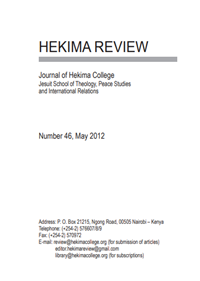Social Sins and Ecological Problems: Should Human Beings Continue to be the Sole Measure of all Things?
Keywords:
Social, Sin, Ecology, HumanAbstract
Our ancestors say, “One who has no idea where he/she is going should at least know where he/she is coming from.” The world is confronted with the monstrous crisis of ecological imbalance stemming from environmental degradation. Confused as to what to do and which direction to take individuals, groups, societies and institutions continue to grope searching for a response or at least some people to hold responsible for the disaster that threatens us. To understand where we are, and in order to chart a way forward we have to ask how we came here in the first place. The human mind has been shaped by thoughts and ideas from historical past. The Protagoran maxim that, of all things, the measure is man, created a world where human beings saw themselves as ends in themselves. Not only did humans realize and emphasize their autonomy, they upheld an ethical vision in which the fate of the world and the shaping of history solely depended on them. Through the scientific prowess of the Enlightenment period the rest of creation became mere objects to be exploited. The reckless and indiscriminate exploitation of nature highlights the sins that humans continue to commit individually and socially. The eminent ecological crisis has also contributed to accentuating the concerns over ecological sin. St. Ignatius of Loyola’s Principle and Foundation represents one among many possible responses to the ecological crisis.
Downloads
Downloads
Published
Issue
Section
License
Copyright (c) 2024 Hekima Review

This work is licensed under a Creative Commons Attribution-ShareAlike 4.0 International License.


